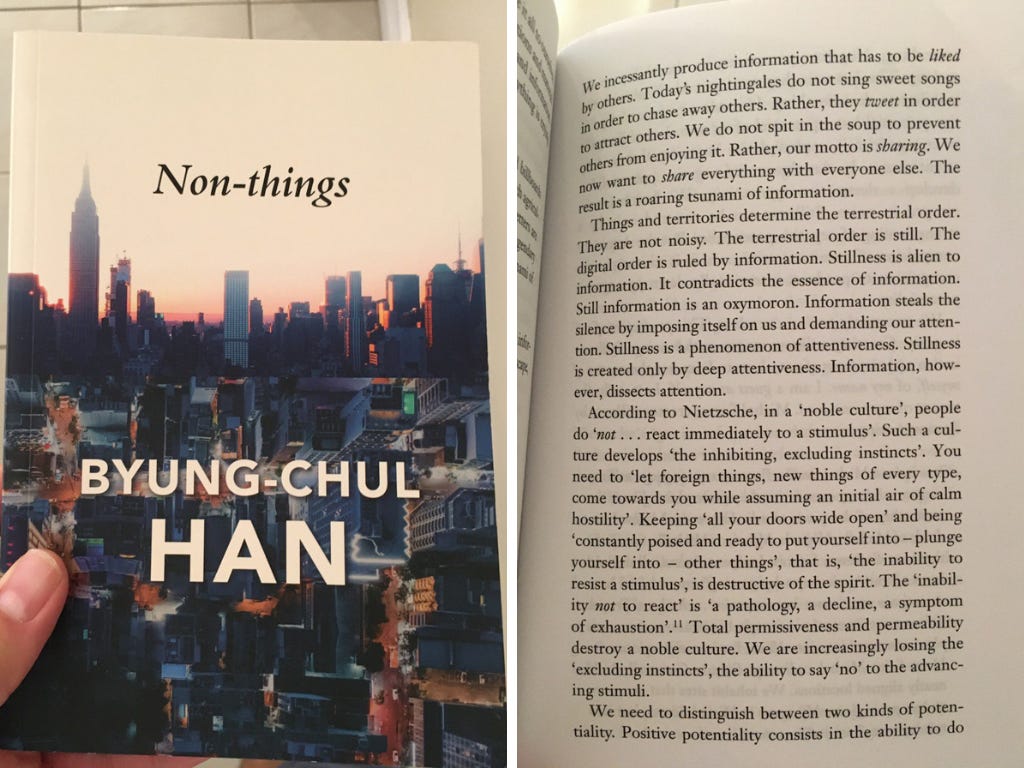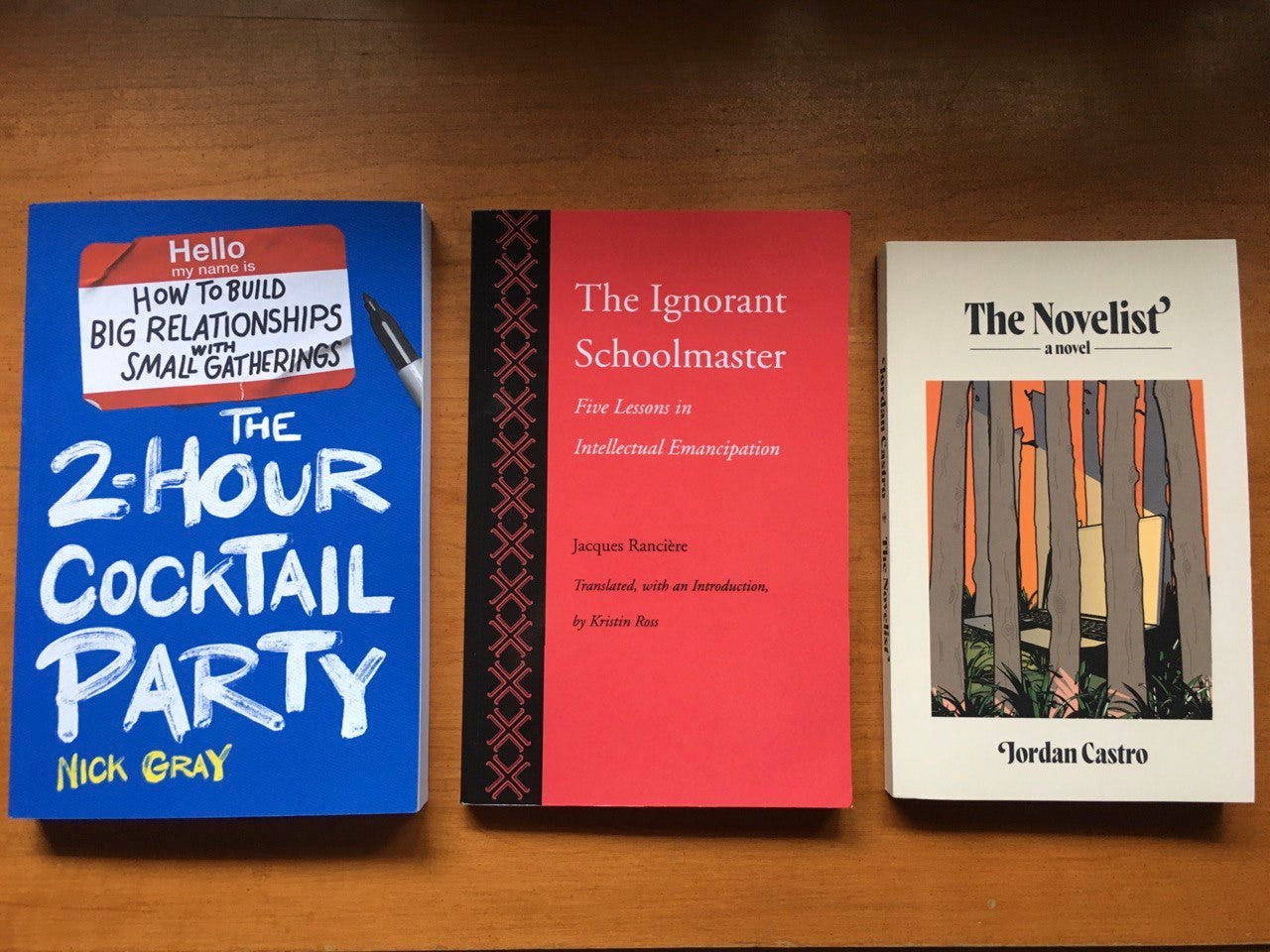A Less Foolish System for Reading Books

In my previous entry, I argued that having a "systems game," adopting and creating personal systems, is a crucial skill for becoming less foolish. The argument expressed formally:
Premise 1: Without systems, life navigation1 will be frustrated.
Premise 2: A systems game is needed for effective life navigation.
Premise 3: A systems game includes unfolding bespoke systems to meet challenges when navigating life.
Premise 4: Unfolding a bespoke system removes imprudent effort, allowing one's focus to be less foolish.
Conclusion: Therefore, cultivating a systems game is required to reduce foolishness.
Systems unfold in response to recurring aspects of reality, like doing tasks and storing information, which the Getting Things Done and Building Second Brain systems mentioned in the previous entry respond to. There are systems for many things: budgeting, having a wardrobe, journaling, ecology of practices, etc. If a system is stifling, then that is not a good system. A good system is a liberating experience.
One of my systems that need an update is reading books. I used to read many books and have read hundreds over the years; during my early twenties, it was one of my core practices. Something happened where the voraciousness of my reading dissipated over the years; perhaps the combination of the rise of social media, podcasts, and blogs distracted me away from books. I initially did not think this was bad, as I was still engaging with lots of rich philosophical material, albeit in different mediums.
However, I still love books, especially in the physical form. While my reading practice has decreased, my book-buying practice is active as ever. My wife teases me about this. I buy a book off Amazon and get excited opening the package, only for it to remain unread in what's becoming a rather extensive library. Admittedly, this practice seems ridiculous and one of my more foolish ones. Author Nassim Nicholas Taleb would call this an "antilibrary," all the unread books one owns.
‘You will accumulate more knowledge and more books as you grow older, and the growing number of unread books on the shelves will look at you menacingly. Indeed, the more you know, the larger the rows of unread books. Let us call this collection of unread books an antilibrary.’
- Nassim Nicholas Taleb, The Black Swan: The Impact of the Highly Improbable
While the antilibrary thought is comforting, it does not address my current lack of reading books. I am called to read books again, especially in their physical form. I like the art form of a physical book, from the cover design to the pacing of propositions or plots. One argument against physical books is the convenience of reading an e-reader or listening to an audiobook. While I see the utility in such approaches, there is something special about the tactile nature of reading a physical book.
My physical books have a certain magic, imbued by my touch, with a history intimated through creased pages, espresso stains, and underlined passages. Essentially, the spirit touches a book through me, fostering a kind of animism that brings it to life. This life is absent in an e-reader, smartphone, or laptop, niduses for what German-Korean philosopher Byung-Chul Han calls “non-things,” aka information. According to Han, a physical object like a book imbues the stillness that history brings, while the “roaring tsunami of information” erodes the stillness needed to attend to something deeply.
I am enjoying the stillness imbued by the writings of fellow Substacker
, a developer of homeschool programs who is a part of the “digital minimalism” scene. In her piece, “Rehabilitating Ferals of the Digital Age,” she recommends an anti-screen approach to reading books, ensuring devices are away from the body:Reading a book on any kind of screen keeps your mind in “device mode” and will likely lead to greater struggles maintaining attention. On that note, keeping devices away from your body and out of reach and sight helps to redirect your mind toward the book in hand. Devices are subconsciously associated with the regular dopamine-drips most of us have grown accustomed to; physical books take you into a different realm and cast off avenues for distraction.
I am bored of getting yanked around by dopamine drips from non-things. I want the still life inspired by living things. I will return to the practice of reading physical books. I'll need to create a system to reacquaint myself with them. Like all my other systems, this less foolish system for reading books will be living, shapeshifting with me, and being tinkered with when needed.
My first draft of this system:
A Less Foolish System for Reading Books
The system has six facets:
Three Ontologies
Being Called
Timed for Timelessness
Order for Unorder
Start When Finished
Review for Attention
Three Ontologies
I will experiment with reading three books at a time: two non-fiction books and one fiction book. Each book will fall into the following category:
One practical book
One viewquake book
One novel
The first two will be non-fiction, with practical books being business-related, self-help, or how-to. A viewquake is economist Robin Hanson's phrase for "insights that dramatically change one's worldview, making one see the world in a new way." A viewbook book is full of viewquakes, changing a worldview forever. Past examples of viewquake books I have read:
Finite and Infinite Games by James Carse
A Brief History of Everything by Ken Wilber
A Language Older than Words by Derrick Jensen
I view the three categories - practical, viewquake, and novel - as corresponding to the transcendentals: good, true, and beautiful. The transcendentals are different properties of being that co-exist with one another. Practical books help do good, viewquake books help see what is true, and novels help be present with what’s beautiful. Different ontologies arise when being with each one of the transcendentals.
Hopefully, their combination leads to less foolishness as well.
Being Called
To avoid the instrumentalized trap of reading books from a place of “should,” I will only read books from a place of being “called.” The book has to call to me in some way. This calling will not be obvious, and mystery will loom. I do not want to know why I am reading these books. I will trust the mystery instead.
Timed for Timelessness
Practice needs discipline, and discipline needs allocated time to practice. I will time block 90 minutes in my calendar, intending to read for 60 minutes, with 30 minutes being a buffer. Having 90 minutes available for an activity, without having a hard stop at the 60-minute mark, often endows a sense of leisure in me. True leisure is a state of timelessness.
Order for Unorder
Within a day's 90-minute block, I will read whatever book calls me the most. I may end up reading one book after the other, or weaving between the three books, putting one down and picking up another.
Start When Finished
I will start on a new set of books to read only after reading the three previous ones selected.
Review for Attention
I will utilize this Substack to review the books in a way that helps me “digest” the book while offering value to others. There will be four sections to this review:
Summary. A paragraph-length summary of the book.
Takeaways. Salient things while reading: a lesson, an inspiration, a concept, etc.
Living question. A question I will be living with after reading the book.
Recommendation. Do I recommend the book to my readers?
Knowing I must answer these while reading will force my attention in less foolish directions. Reviewing the books publicly will hopefully give me less foolish attention as well. I’ll review these books in this Substack whenever I finish all three, calling out three new books to read at the end of the entry.
***
The first three books I will be reading:
Practical book: The 2-Hour Cocktail Party: How to Build Big Relationships with Small Gatherings by Nick Gray. I have heard great things about this book and sense it will assist my “scenemaking” to make “Toronto the Wise.”
Viewquake book: The Ignorant Schoolmaster: Five Lessons in Intellectual Emancipation by Jacques Rancière. I first encountered this book from a strange subreddit called Sorcery of the Spectacle. The arguments within seem to map to my wisdom commons midwifery approach.
Novel: The Novelist: A Novel by Jordan Castro. This book topped numerous lists for best new books in 2022 and is about the timely topic of contending with non-things.
What three books do you recommend? What three books are you called to read?
Also known as “existential wayfinding,” find your way in life and perhaps find “the way.”



